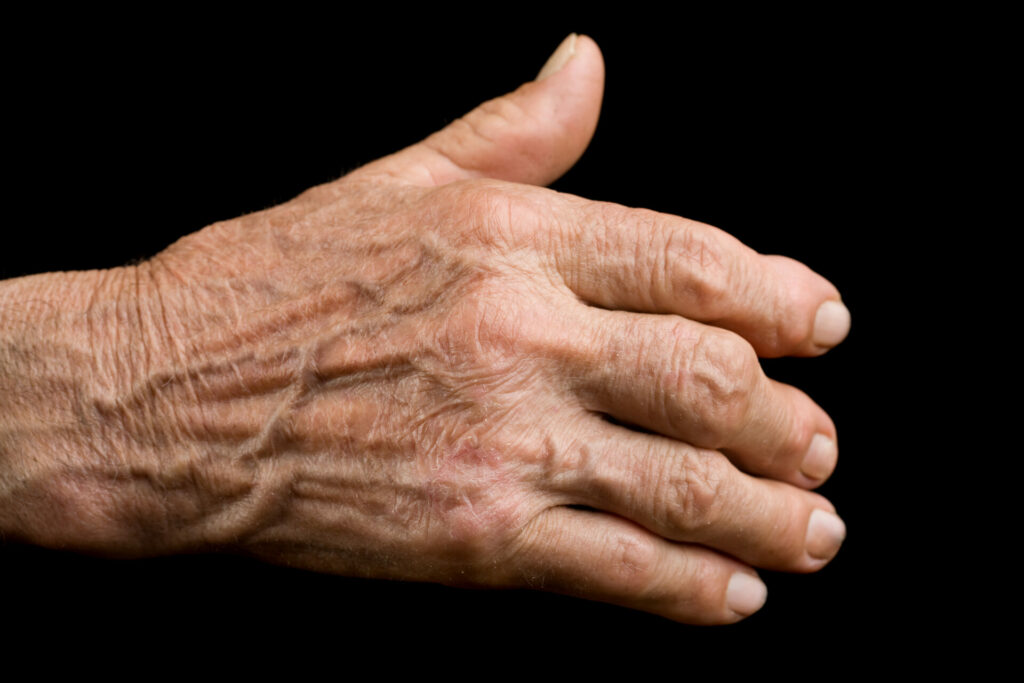Rheumatoid arthritis (RA) is a long-term condition that causes symptoms ranging from mild to severe. RA has 4 distinct stages and is progressive, meaning it gets worse over time if left untreated [1].
What are the 4 stages of rheumatoid arthritis? Here, we’ll explore each stage in detail and provide insights into how RA is diagnosed, treatment for RA, remission and how to prevent progression. We’ll also discuss how Harley Street Specialist Hospital’s rheumatologists and pain management unit can help you manage RA as well as possible.
What are the 4 stages of rheumatoid arthritis?
Rheumatoid arthritis is an autoimmune condition, meaning your body mistakenly attacks healthy cells. In the case of RA, the immune system attacks healthy tissue in your joints, causing inflammation and joint damage [2]. RA usually affects joints on both sides of your body.
RA is progressive [1] which means that if left untreated, it gradually gets worse. Luckily, modern treatments are continually improving and it is now possible for people with RA to live a normal, healthy life.
Symptoms of RA include:
- Fever
- Fatigue
- Loss of appetite
- Stiff, painful joints – usually on both sides of the body
Let’s explore each stage of RA in more detail.
Stage 1 (mild)
Stage 1 is early-stage RA, when inflammation begins in your joints. You may notice joint pain, swelling or stiffness. As the tissue in your joint swells up, your joint lining (synovium) becomes inflamed.
RA can be difficult to diagnose at this stage because symptoms are not obvious. You may have stage 1 RA and be completely unaware of it.
Although challenging to diagnose at this stage, stage 1 is the best time to discover RA because it responds very well to treatment. If diagnosed and treated promptly, stage 1 RA is more likely to go into remission [1].
Stage 2 (moderate)
At stage 2, the inflammation of your synovium causes damage to the bones and cartilage of your joints. Cartilage is the tissue that covers the ends of bones in your joints.
At stage 2, you may experience pain and a restricted range of movement. You may have trouble moving the joint – for example, if you have RA in your wrists, they may feel stiff and you may struggle to bend them or turn a key in a lock.
Although symptoms are more obvious than stage 1, stage 2 RA still may not show up on blood tests. This is because blood tests look for RA antibodies, which most people with RA have in their blood for years before any symptoms develop. However, some people have seronegative RA, in which antibodies and proteins do not show up at any stage during blood tests. We’ll discuss the different types of RA later on.
Stage 3 (severe)
At stage 3, damage to your joints becomes severe and the cartilage may wear away completely. This means your bones rub together without any cushioning, damaging the bones further.
Pain and swelling worsen, and you may also experience loss of mobility and muscle weakness. There may be permanent, visible bone changes such as thickened knuckles and twisted fingers.
You are also at risk of tendons in your wrist becoming compressed and symptoms of carpal tunnel syndrome, where nerves in your wrist become compressed. Symptoms include weakness, tingling and nerve pain in your hands.

Stage 4 (end-stage)
Stage 4 is the final stage of RA. The bones of your joints may fuse together completely, known as ankylosis.
You may still experience muscle weakness, pain, stiffness, swelling and a loss of mobility. It may be very difficult for you to use the areas most affected by RA, such as your hands, hips or knees.
It can take years to progress through all 4 stages of RA, and many people never reach stage 4. Only 0.8% of people with RA ever experience ankylosis [3].
How is RA diagnosed?
Rheumatologists are doctors who specialise in diagnosing RA and other types of arthritis. If your doctor thinks you may have RA, they may refer you to a rheumatologist for further tests.
There are several tests your rheumatologist may use to diagnose RA. They include a physical examination, blood tests, MRIs and X-rays.
Blood tests search for specific proteins and antibodies associated with RA and high levels of inflammation. These tests also help to rule out other conditions that could be causing your symptoms, such as lupus, osteoarthritis, gout and psoriatic arthritis.
Harley Street Specialist Hospital is well-equipped to diagnose RA. Our expert consultant rheumatologists will know which tests you need and thanks to our diagnostic imaging suite, these tests can be carried out on-site. Once you are diagnosed, our rheumatologists work closely with the wider pain management team to craft a treatment plan suited to you.
Treatment for the different stages of RA
The treatment you receive will depend on which stage your RA has reached, how long you’ve had RA, the severity of your symptoms, and whether you have any other medical conditions.
Stage 1-2
In the early stages of RA, the focus is on controlling joint inflammation. The goal of this is to reduce your symptoms and prevent joint damage.
Your rheumatologist may recommend a disease-modifying antirheumatic drug (DMARD), such as methotrexate. They may also suggest a low-dose steroid or nonsteroidal anti-inflammatory drugs (NSAIDs), like ibuprofen.
Stage 2-3
Once your RA reaches a moderate stage, you may tire quickly or struggle with daily activities because of pain. Your doctor may combine methotrexate with other DMARD medications to increase its effect. They may also try biologic DMARDs (a stronger type of DMARD), such as certolizumab.
Your doctor may also prescribe Janus kinase (JAK) inhibitors or tumour necrosis factor (TNF) inhibitors. These drugs prevent inflammation, but they can come with side effects such as an increased risk of infection and malignancy, and worsening of existing heart conditions [4,5].
If you have a very inflamed joint, you may be offered steroid injections. You may also need physiotherapy – Harley Street Specialist Hospital offers a private physiotherapy department, allowing seamless communication between your consultant rheumatologist and physiotherapist.

Stage 3-4
If you have severe RA, your rheumatologist may try different medications. Different types of biologic, JAK inhibitor or TNF inhibitor may work for different people.
The last resort for severe RA is surgery. If your joints are damaged and deformed enough to restrict your mobility, surgery may be the best option for you.
The goal of surgery is to reduce pain, repair damage caused by RA and improve your ability to complete daily activities. The most common types of surgery for RA are:
- Joint fusion – In a joint fusion, two joints are fused together and realigned.
- Joint replacement – Hip, knee, shoulder, ankle and other joints can be removed and replaced with an artificial joint. These are often made of metal, ceramic, plastic or a mixture of these materials.
- Tendon repair – If a tendon ruptures, your surgeon may sew it back together. Your tendon may be transferred to a different location to rebalance your joint.
Harley Street Specialist Hospital works with world-class orthopaedic and spinal surgeons, who are highly experienced in procedures like these. If you need surgery for severe RA, your rheumatologist and surgeon will work together to ensure the best health outcomes.
What is remission in RA?
Remission in RA describes a period of minimal disease activity, during which your symptoms may significantly improve and the process of joint damage stops [6]. Sometimes, during remission, no RA antibodies appear in tests for people who previously tested positive. If the remission lasts more than a few months, it is called sustained remission – although there’s no standardised definition for this term.
RA remission rates range between 16.3% and 23.5% [7]. Remission is a realistic goal for people with early-stage RA [8], and the likelihood of remission is increased with the use of DMARDs [8].
How to prevent progression of RA
Here, we’ll run through a few ways to prevent the progression of RA and encourage remission.
Early diagnosis
The first step to preventing the progression of RA is early diagnosis. When diagnosed in its early stages, remission is much more likely [8] and treatment methods are often more effective, with fewer side effects.
If you are concerned that you may have symptoms of RA, book an appointment at Harley Street Specialist Hospital. Our team of consultants and radiographers can help with rapid diagnosis of your symptoms, so you can get started with the best treatment as soon as possible.
Effective treatment
Working with a rheumatologist as soon as possible is your best chance at halting the progression of RA. Treatments that reduce inflammation will limit damage to your joints and cartilage, while treatments for pain allow you to move more easily, exercise and prevent your joints from stiffening further.
Consultant rheumatologists at Harley Street Specialist Hospital are highly experienced in treating RA. If you already have a diagnosis of RA, we can provide rapid treatment for your symptoms.
Lifestyle changes
Some simple lifestyle changes can have a big impact on your symptoms of RA. Here are some lifestyle factors that impact the symptoms of RA:
Exercise
Exercise has been shown to improve function in people with RA, and reverse the weakness and muscle wasting that many people with RA struggle with [9]. The best exercise type will differ depending on your symptoms and fitness level, but it’s best to start with something gentle and low-impact, like walking.
An added bonus is that cardiovascular exercise releases endorphins, your body’s natural painkillers [10]. By participating in gentle exercise like swimming, cycling or walking, you may experience less pain, build muscle strength and reduce joint stiffness.
You may be unsure where to start with exercise for RA, or feel that exercise is too difficult or painful. If this is the case, book an appointment with a physiotherapist who will create a tailored exercise program at the right level for you, to avoid flaring up your symptoms.
Diet
Research suggests that eating anti-inflammatory foods can improve the symptoms of RA [11]. Omega-3 fatty acids, such as those found in fish oils, have been shown to be particularly beneficial [11].
Examples of foods that may help to manage RA symptoms include:
- Fatty fish like salmon, tuna and sardine
- Olive oil
- Whole grains
- Fruits and vegetables
- Nuts
- Beans and peas
Getting plenty of sleep is also important to manage symptoms. Research shows that a lack of sleep worsens pain, depression and fatigue in people with RA [12].
Treating RA at Harley Street Specialist Hospital
Our team can assess, diagnose and treat symptoms of RA. Our consultant rheumatologists will be with you every step of the way as they craft your personalised treatment plan. With efficient diagnosis and effective treatment, you can prevent RA from progressing and maximise your quality of life. Book an appointment today.




